- Home
- Lisa Smedman
Forgotten Realms - House of Serpents 1 - Venom's Taste Page 4
Forgotten Realms - House of Serpents 1 - Venom's Taste Read online
Page 4
“Does this cult have a name?” he asked.
Zelia gave a slight, supple nod. “They call themselves the Pox.”
“Can you tell me anything else about them? How I can find them again, for example?”
Zelia smiled. “What would you do if you found them?”
“Rescue my friend.”
Zelia frowned. “Rushing in will only alert the Pox to the fact that someone is watching them,” she told him. “And it would serve no purpose. Your friend is already dead.”
When Arvin began to protest, she held up a hand. “As would you be, if you hadn’t proved stronger than the rest. But there is a way for you to avenge your friend’s death. Would you like to hear what it is?”
Arvin’s eyes narrowed. He could tell when he was being manipulated. How did this woman know for certain that Naulg was dead? Like Arvin, he might have fought off the draught of plague. He might still be alive—and a captive. Arvin nodded.
“I want to know more about the Pox—things that only a human can uncover,” she continued. “I’d be willing to pay for that information, providing the human was smart and knew how not to tip his hand.”
Arvin feigned only a passing interest by crossing his arms and leaning back in his chair. “How much?”
Zelia took a sip of her ale—not quite quickly enough to hide her smile. Her teeth were human—square and flat, rather than the slender, curved fangs some yuan-ti had. “Enough.”
It was Arvin’s turn to stare. “Why do you need a human?” he asked at last.
“The cultists won’t accept any other race into their ranks.”
Arvin wrinkled his nose in disgust as he realized what she was asking him to do. “You want me to join their cult? To worship that foul abomination of a goddess? Never!”
Zelia’s expression tightened. Too late, Arvin realized what he’d just said. “Abomination” was the word that humans elsewhere in the Vilhon Reach used to describe the yuan-ti who had the most snakelike characteristics. It was an insult that no human of Hlondeth ever dared use. It commonly provoked a sharp, swift—and fatal—bite in return, or a slow constriction.
Arvin swallowed nervously and half-closed his gloved hand, ready to call the dagger to it, but Zelia let the insult pass.
“To pretend to join their cult,” she said.
Arvin shook his head. “The answer is still no.”
“Is it because of your faith you refuse?” she asked.
For one unsettling moment Arvin wondered if she was referring to Ilmater, if she knew about his time in the orphanage and the endless attempts by the clerics to instill in the children under their care a sense of “eternal thankfulness for the mercy of our lord the Crying God.” Then he realized that Zelia was simply asking a general question. “I don’t worship any particular deity,” he told her. “I toss the occasional coin in Tymora’s cup for good fortune, but that’s all.”
“Then why do you refuse?”
Arvin sighed. “I’m a simple merchant. I import ropes and nets. For this job, you need an actor—or a rogue.”
Zelia’s eyes narrowed. “It’s you I want. You survived the disease the Pox infected you with. In their eyes, that makes you blessed.”
“I see.” He decided to see how badly she wanted these cultists. “I lost one thousand gold pieces last night. Would you be willing to pay that much for me to spy on them?”
Zelia gave a dismissive wave of her hand, as if the figure he’d just named were pocket change. “Certainly.”
“Five thousand?”
“Yes.”
“Ten?”
Zelia gave him a tight smile. “If you produce the desired results, yes—and if you follow orders.”
With difficulty, Arvin kept his expression neutral. As he collected his thoughts, he sipped his ale and considered her offer. Ten thousand gold pieces was a lot of coin—enough to get him out of Hlondeth and free him from the Guild’s clutches forever. But he wondered for whom Zelia was working. Someone with deep pockets, obviously—perhaps someone with access to the royal coffers. Unless she was lying about the coin, and didn’t intend to pay anything, which was more likely when you came right down to it. A classic bait and jump—offer the victim anything he asks for then give him more than he bargained for.
“Well?” Zelia asked. “Will you do it?”
Arvin shuddered, remembering the terrible pockmarks on the cultists’ skin. Was that how his mother had looked as she lay dying? He decided he couldn’t bear the foul touch of their fingers again, even if they carried no taint. Even for ten thousand gold pieces.
“No,” he answered. “Not for all the coin in the Extaminos treasury. Find someone else.” He set his ale down and started to rise from the table.
Surprisingly, Zelia didn’t protest. Instead, she took a long swallow of the ale in front of her, gulping down the egg inside it. When she was finished, she licked her lips with a tongue that was longer than the average human’s, with a slight fork at the end of it ...
A blue tongue.
Arvin felt his eyes widen. He sank back into his seat. “You were the snake in the rowboat.”
“Yes.”
“You neutralized the poison?”
Zelia nodded.
“Why?”
“I wanted you alive.”
“Knowing—thanks to your ‘hunch’—that I’d return to the Coil, and I’d tell you my story,” Arvin said.
“Yes.”
Anger rose inside Arvin, flushing his face. “You used me.”
Zelia stared at him. “I saved your life.”
“The answer’s still no. I won’t join the cult.”
“Yes you will,” Zelia said slowly. “Seven days from now, you will.”
She said it with such certainty that it gave Arvin pause. “What do you mean?” he asked slowly.
“After I neutralized the poison, I planted a ‘seed’ in your mind,” Zelia said. “A seed that takes seven days to germinate. At the end of those seven days, your mind will no longer be your own. Your body will be mine—to do with as I will.” She leaned across the table and lightly stroked his temple with her fingertips then sat back, smiling.
Arvin stared at her, horrified. She was bluffing, he told himself. But it didn’t feel like a bluff. Her smile was too confident, too self-satisfied—that of a gambler who knows he holds the winning hand. And now that she’d drawn his attention to it, Arvin could feel a faint throbbing in his temple, like the beginning of a headache. Was it the “seed” spell she had cast on him, putting down roots?
“What if I agree to join the cult?” he asked. “If I do that, will you negate the spell?”
Zelia hissed softly. “You’ve changed your mind?” Her lips parted to add something more, but just then, from somewhere behind Arvin, there came a shout of dismay and the sound of chairs being scuffed hurriedly back—and the clink of chain mail.
Turning on his chair—slowly, so as not to attract attention to himself—Arvin saw a dozen men in armor descending the ramp: Hlondeth’s human militia. Each wore a helmet that was flared to resemble the hood of a cobra, with a slit-eyed visor that hid the face from the nose up. The bronze rings of their chain mail shimmered like scales as they marched into the tavern. They were armed with strangely shaped crossbows. Arvin observed how these worked a moment later, when a boy in his teens leaped from his chair and tried to run to a door that led to the tavern’s stockroom. At a gesture from their sergeant—a large man with a jutting chin and the emblem of two twined serpents embossed on the breastplate he wore—one of the militia pulled the trigger of his crossbow. A pair of lead weights linked by a fine wire exploded from the weapon, whirling around one another as they flew through the air. The wire caught the youth around his ankles, sending him crashing into a table.
The silence that followed was broken only by the sound of a mug rolling across the table and falling with a soft thud into the sawdust below. Then, as the man who had shot the crossbow strode across the room to apprehend the r
unaway, the sergeant spoke.
“By order of Lady Extaminos, I am commanded to find crew for a galley,” he announced. “Those who have previously served in the militia are exempt. Roll up your sleeves and account for yourselves.”
A handful of men in the tavern dutifully began to roll up their sleeves, exposing the chevrons magically branded into their left forearms by battle clerics—chevrons that recorded the four years of service required of every human male in Hlondeth. Arvin, meanwhile, glanced around the tavern, his heart pounding. A galley? Their crews had even less expectation of coming home again than the men who were sent to the Cloven Mountains to fight goblins. Arvin wasn’t so foolish as to get up and run; he’d get no farther than the bare-armed youth who was being hustled toward the exit. The one avenue of escape—the wide, sloping ramp that led up to the seawall above—was blocked by militia, who were only letting men with chevrons leave the tavern.
More worrisome still was the man who stood beside the sergeant. He wore neither helmet nor armor, and carried no weapon other than the dagger sheathed at his hip. He had strange eyes with a curious fold to the eyelid—Arvin’s mother had described the peoples of the East as having eyes like that. Judging by his gray hair and the deep creases at either side of his mouth, he was too old to be a regular militiaman. He stood with one hand thrust into a pocket—closed around a concealed magical device, perhaps—as he scrutinized the faces of the men in the tavern, one by one.
This was no press gang. The militiamen were searching for someone.
Arvin swallowed nervously and felt the bead he wore shift against his throat. “Nine lives,” he whispered. Reaching down, he began to unfasten his shirt cuff. As he pretended to fumble with the laces, he turned to Zelia.
“I won’t be able to spy for you if I’m aboard a galley,” he whispered. “If you have any pull with the militia, use it now.”
Zelia’s lips twitched into a slit of a smile. “You accept my offer?”
Arvin nodded vigorously as a member of the militia approached their table.
“Too late.” With a supple, flowing motion, she rose from her chair. Cocking her head in Arvin’s direction, she spoke to the man approaching their table. “Here’s one for you.” Then she strode away.
As the man’s visored eyes locked on him, Arvin felt the hair at the back of his neck rise. His hand froze on his shirt cuff. Even if the press gang was a sham, the fact remained that he’d never served his time with the militia. In order to keep up the pretense of the press gang, they’d have to arrest him. They’d toss him in jail, where, in seven days’ time, Zelia’s spell would take effect.
Arvin couldn’t allow that to happen. The only way he could find out whatever Zelia wanted to know about the Pox, and save himself, was to remain a free man.
The militiaman raised his crossbow. “Roll up your sleeve.”
Arvin forced his lips into a smile. “There’s been a mistake,” he began, rising to his feet. “I served my four years, and they branded me, but a year ago I contracted an illness that”—his mind raced as he tried to think up a story the man would actually believe—“that left me terribly pockmarked.” He dropped his voice to a confiding whisper. “I think it was plague.”
Arvin widened his eyes in mock alarm, but it didn’t have the expected result. The militiaman stood firm and unflinching. He’d obviously heard similar excuses before.
Arvin pressed on hurriedly. “Only recently did I earn enough coin for a tithe. The cleric who healed me did a wonderful job—he actually restored my skin to an unblemished condition. But in the process, he erased my chevrons. See?”
Rolling up his sleeve, Arvin showed the man his bare arm. As the militiaman looked at it, Arvin felt the base of his scalp begin to prickle. Quickly, he caught the militiaman’s eye and gave him a friendly grin. “Listen, friend, it’s true that I haven’t served,” Arvin said. “But you could let me go this time—right? Since this isn’t really a press gang and I’m not the man you’re looking for.”
Slowly, the militiaman’s expression changed, until his smile mirrored Arvin’s own. “Don’t worry,” he whispered back. “I won’t tell them about you.”
“Thanks,” Arvin said, rolling down his sleeve. “I knew I could count on you, friend.” He turned then and began walking toward the ramp, as if the militiaman had granted him leave to go. Zelia was just exiting; the militiamen blocking the ramp parted to let her pass, leaving a gap in their ranks. Arvin lengthened his stride, but then the gray-haired man turned his full attention in Arvin’s direction. Arvin saw the man’s strangely shaped eyes narrow slightly as he glanced down at Arvin’s gloved hand then up at his face again. His expression hardened.
He’s recognized me as Guild, Arvin thought, fighting down panic. Or he’s mistaken me for whoever the militia are looking for. Either way, I’m in trouble. If only I could distract him for just an instant ...
The prickling sensation he’d felt at the base of his scalp a moment ago, when he’d charmed the militiaman, returned—this time deep in Arvin’s throat. Within heartbeats it became so strong that Arvin began to hum involuntarily. A low droning filled the air—a sound like that of a bow being drawn against the low bass string of a musical instrument. The militiamen and their sergeant all glanced around as if trying to find its source, but its effect on the gray-haired fellow was even more dramatic. He suddenly lost interest in Arvin and stared at the far wall, a far-off look in his eyes, as if he were completely engrossed in it.
Now! Arvin thought. Seizing his chance, he bolted. He sprinted through the gap in the ranks, and, as one militiaman lunged out to grab him, made the most of the man’s mistake by grabbing the fellow’s hand and using the man’s own momentum to tumble him into the fellow behind him. He heard the snap-whiz of a crossbow being fired—and a sharp exhalation just behind him, followed by curses, as the wire-linked weights wrapped around the man he’d just tumbled. Zelia, farther up the ramp, turned to see what the commotion was. As Arvin sprinted past her, he saw her eyes widen. Then Arvin was around a bend in the ramp and running up it as fast as his pumping legs would carry him.
He emerged onto a seawall limned red by the rising sun—the start of another hot, muggy day. He ducked left into a narrow street, and as soon as he was a few paces down it, leaped headlong at a wall. Fingers splayed, he activated the magic of the leather cord knotted around his wrist. His fingers and boot toes found cracks in the stonework that ordinarily would have offered no purchase, allowing him to scramble up the building like a cat climbing a tree.
Below and to his left, two militiamen emerged onto the seawall. Arvin froze, not wanting to betray his position with movement. One of the men stopped, crossbow at the ready, to stare down the narrow street Arvin had entered, but Arvin was already level with the building’s third story—well above where anyone would reasonably expect him to be. The militiaman looked away.
“Nine lives,” Arvin panted, grinning.
Then the gray-haired man stepped into sight beside the militiaman. He held an unusual object in his hand—three finger-sized crystals, bound together with silver wire and pulsing with a faint purple glow. Arvin had never seen anything like it before. The militiamen heeded the call of one of their fellows, ran farther up the seawall, and ran off, but the gray-haired man stood, still staring at the crystals. Then, slowly, he looked up.
Right into Arvin’s eyes.
“There he is!” he shouted, pointing.
Arvin cursed and resumed his climb up the wall. The top of the building was just above him—one quick scramble and he was on the roof, a spot where the crossbows wouldn’t be able to take him down. He ran lightly along the slate tiles, in a direction they wouldn’t expect—back toward the seawall. From below, he could hear the gray-haired man shouting directions.
With a sinking heart, Arvin realized the man had guessed the direction in which he was headed. Arvin abruptly changed direction—and heard the man below shout that the quarry was going this way, not that way. Cursing, Arvi
n changed direction again, sending a tile skittering down the rooftop, but that telltale sign was the least of his worries.
The gray-haired man below had magic that could track Arvin, whichever direction he ran. Arvin’s only hope was to somehow get out of its range.
CHAPTER 3
23 Kythorn, Sunrise
Arvin ran toward the rear of the warehouse, his feet slipping on the tiles. The rooftop was domed, forcing him to run with one leg slightly cocked and his other against the metal gutter that ringed the roof, his arms extended for balance. He made for the rear of the warehouse, toward the point where the curve of the building across the street forced the street to narrow. A split-second glance told him he was in luck; the ramp that spiraled up the outside of that building was one story lower than the warehouse rooftop.
He sprinted the final few steps and hurled himself into the air. He landed on his feet on the ramp of the building opposite, but momentum carried him forward, sending him crashing into the wall. Hot sparks of pain exploded in his nose as his face slammed into the smooth, hard stone. As he staggered down the ramp, nose dripping blood, he startled two men in tattered trousers and sweat-stained shirts who were hauling a two-wheeled handcart up the ramp. Each man had several days’ growth of stubble—not quite enough to hide the S that had been branded into his left cheek.
Shouts came from the street below. A quick glance over the edge of the ramp told Arvin the militia had rounded both sides of the warehouse and were almost in a position to shoot up at him. Arvin had to get off the ramp—and quickly.
He ran headlong at the two slaves, shouting, “Out of my way!” Shoving his way between them, he leaped onto the handcart. He’d intended only to scramble over it and continue running down the ramp, but the force of his landing jerked the poles out of the slaves’ hands. Suddenly the cart was rolling down the slope, poles scraping the stone behind it. Arvin teetered on top of its load, sacks of grain from the Golden Plains. His eyes widened as it careened toward the edge, but before he could jump, one wheel thumped against the low, outside lip of the ramp. The jolt staggered Arvin, nearly spilling him from the cart.

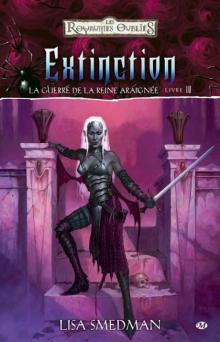 Extinction
Extinction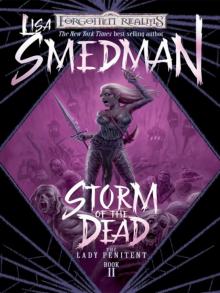 Storm of the Dead
Storm of the Dead Blood Sport
Blood Sport The Lucifer desk (s-2)
The Lucifer desk (s-2)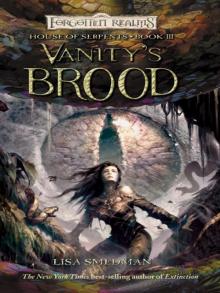 Vanity's Brood
Vanity's Brood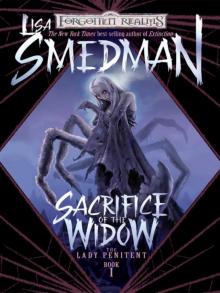 Sacrifice of the Widow
Sacrifice of the Widow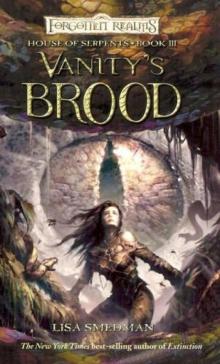 Vanity's brood hos-3
Vanity's brood hos-3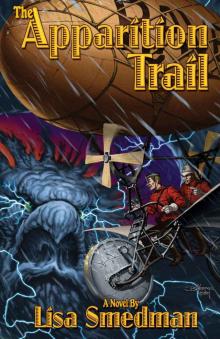 Apparition Trail, The
Apparition Trail, The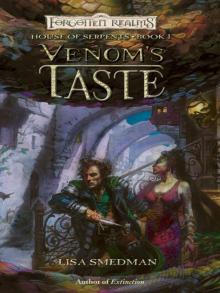 Venom's Taste
Venom's Taste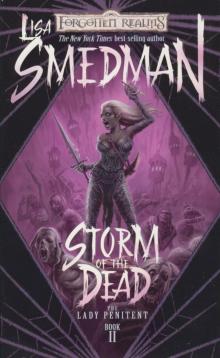 Forgotten Realms - The Lady Penitent - Storm of the Dead
Forgotten Realms - The Lady Penitent - Storm of the Dead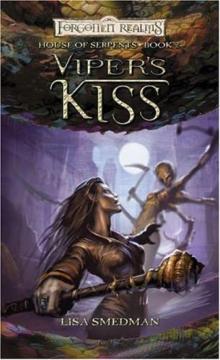 Viper's kiss hos-2
Viper's kiss hos-2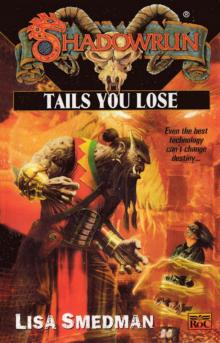 Tails You Lose
Tails You Lose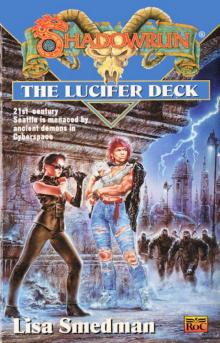 The Lucifer Deck
The Lucifer Deck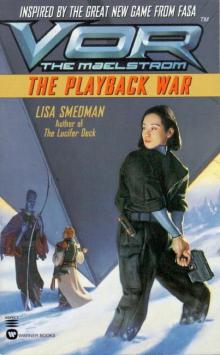 Vor: The Playback War
Vor: The Playback War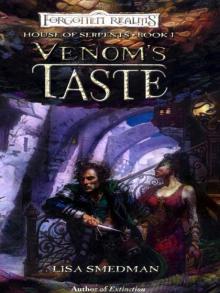 Forgotten Realms - House of Serpents 1 - Venom's Taste
Forgotten Realms - House of Serpents 1 - Venom's Taste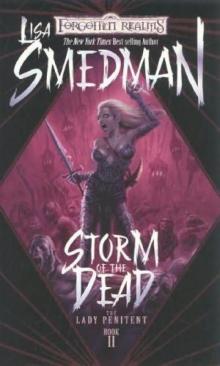 Storm of the Dead зкp-2
Storm of the Dead зкp-2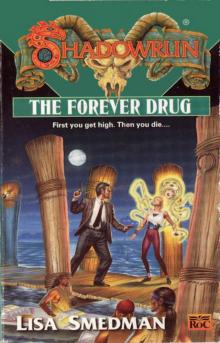 The Forever Drug
The Forever Drug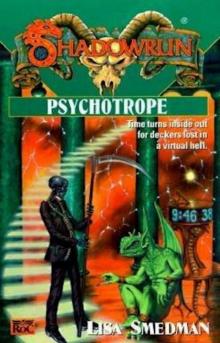 Psychotrope
Psychotrope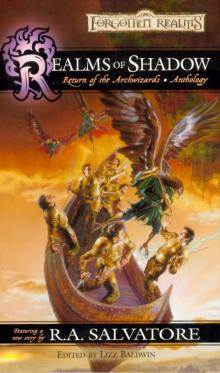 Realms of Shadow a-8
Realms of Shadow a-8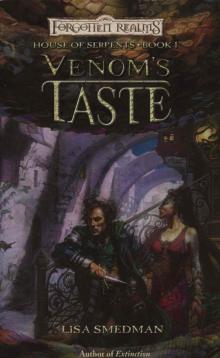 Venom’s Taste hos-1
Venom’s Taste hos-1 Psychotrope s-33
Psychotrope s-33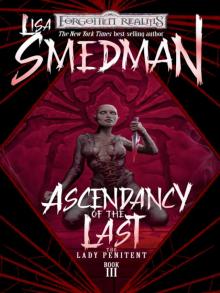 Ascendency of the Last
Ascendency of the Last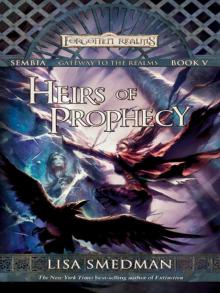 Heirs of Prophecy
Heirs of Prophecy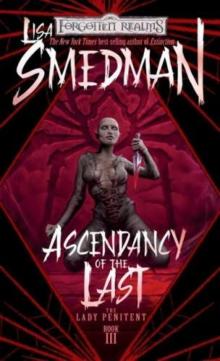 Ascendancy of the Last зкp-3
Ascendancy of the Last зкp-3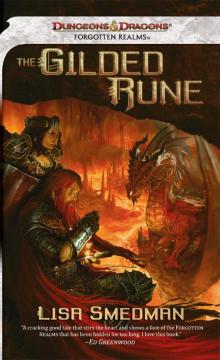 The Gilded Rune (forgotten realms)
The Gilded Rune (forgotten realms)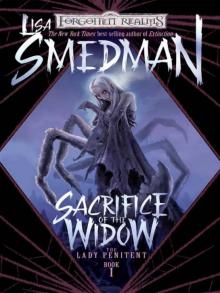 Sacrifice of the Widow: Lady Penitent, Book I
Sacrifice of the Widow: Lady Penitent, Book I The Lucifer desk s-23
The Lucifer desk s-23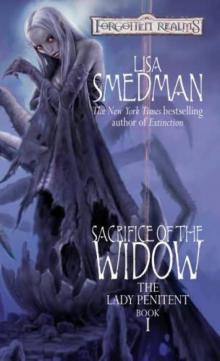 Sacrifice of the Widow lp-1
Sacrifice of the Widow lp-1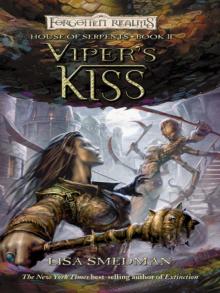 Viper's Kiss
Viper's Kiss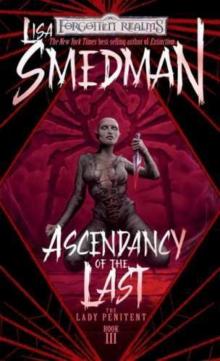 Forgotten Realms - The Lady Penitent - Ascendancy of the Last
Forgotten Realms - The Lady Penitent - Ascendancy of the Last